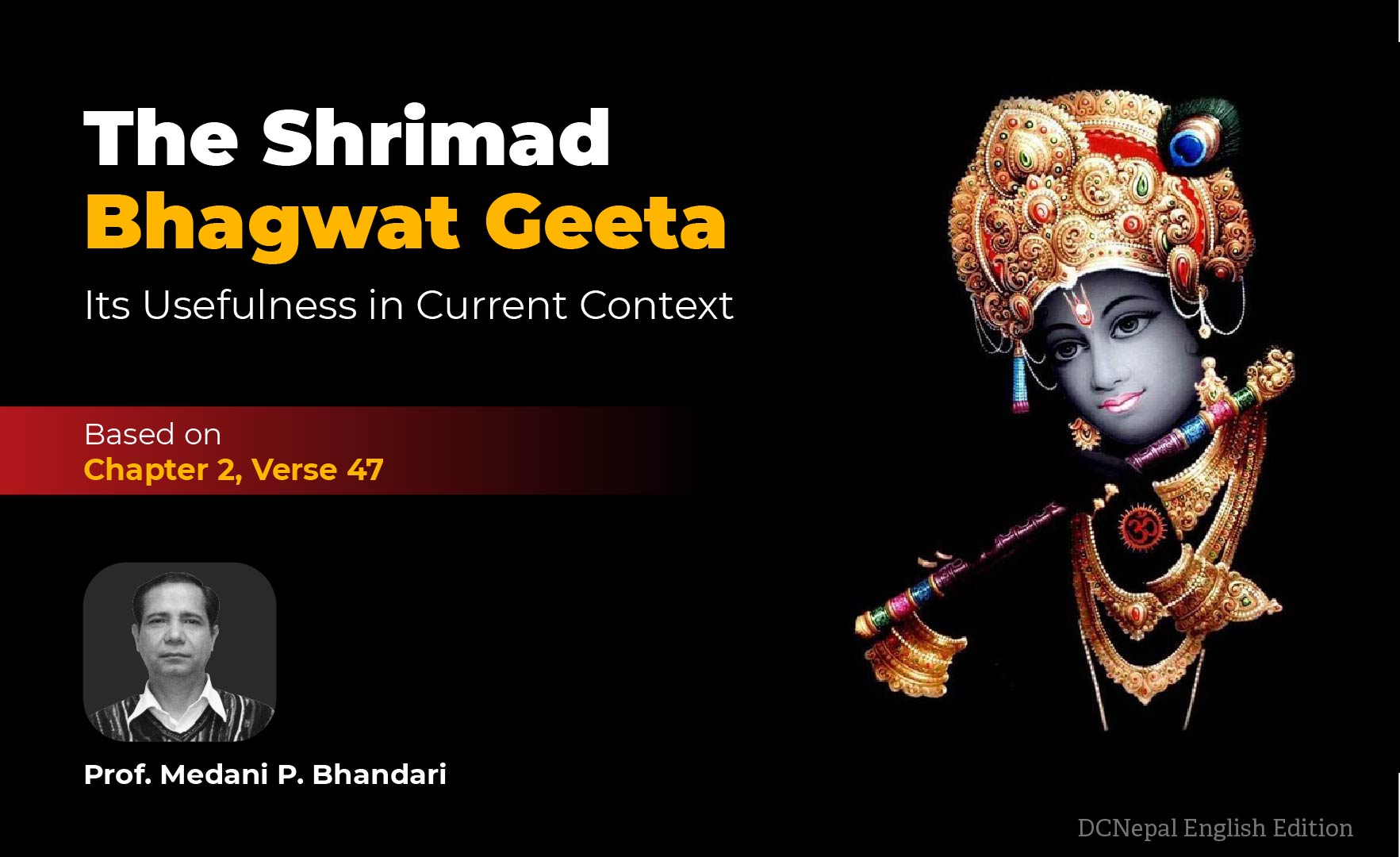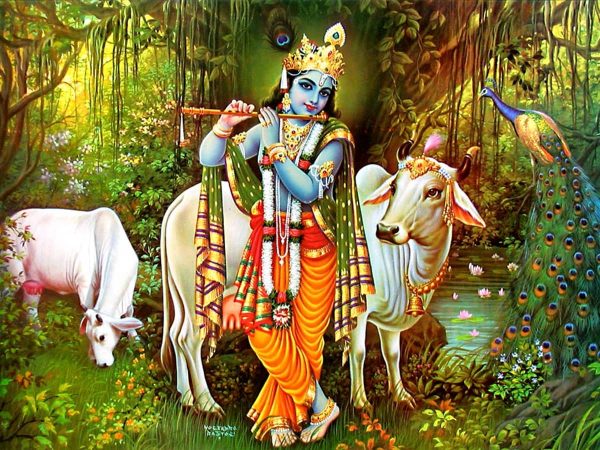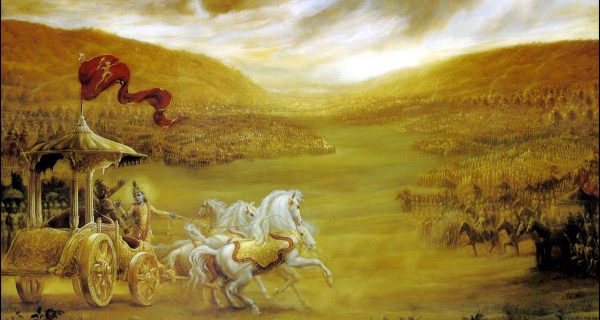The Shrimad Bhagwat Geeta and its Usefulness in Current Context
With reference to Chapter 2 Verse 47- कर्मण्येवाधिकारस्ते मा फलेषु कदाचन

As a social scientist and environmental scholar with the work comprising several books and numerous scientific papers, I have dedicated more than four decades of my life to social service, serving in executive roles within universities and non-profit organizations. My journey has taken me to various corners of the world, where I have observed and experienced a common thread: a pervasive lack of genuine happiness among people.
Through my experiences, I have come to a profound realization that true happiness is not contingent upon material possessions or external circumstances. Instead, it is an entirely subjective and personal experience, shaped by our perceptions and attitudes towards the world around us.
I have realized that the spiritual dimensions that transcend religious affiliations and offer powerful tools to foster personal resilience and collective tolerance during challenging times. My studies have delved into the essence of various religious traditions, including Taoism, Christianity, Judaism, primal religions, Buddhism, Hinduism, Confucianism, and Islam etc., seeking wisdom and insights from their original texts.

While all these traditions hold valuable teachings, in this series, I wish to embark on a journey of exploration with a focus on the Bhagavad Geeta—a sacred Hindu scripture that has captivated my attention due to its profound importance in daily life.
The Bhagavad Geeta, nestled within the epic Mahabharata, is a timeless dialogue between Prince Arjuna and Lord Krishna, unfolding on the battlefield of Kurukshetra. In its verses, I have discovered invaluable life lessons, ethical principles, and a guide to navigating the complexities of existence.
In this series, I will try to reach into the teachings of the Bhagavad Geeta and its relevance in contemporary times, as it offers a pathway towards inner fulfillment, ethical decision-making, and spiritual growth. The wisdom it imparts is not limited by geographical boundaries or religious affiliations; instead, it holds universal truths that resonate with the core of human existence.

The knowledge, wisdom, and the pathways of the Bhagavad Geeta-Depends on how an individual can adapt and follow.
Throughout the ages, thousands of scholars have extensively explored the Bhagavad Geeta, delving into its profound teachings, practical applications, and spiritual significance. Despite this vast body of knowledge, the essence of the Bhagavad Geeta remains an enigmatic mystery, as it encompasses layers of wisdom that continue to reveal new insights to seekers.
As an individual, I humbly acknowledge that describing and interpreting the profound feelings and arguments embedded within the Bhagavad Geeta is a daunting task. The vastness of its knowledge is akin to an ocean, and my understanding merely scratches the surface.
Each person’s understanding of the Bhagavad Geeta is unique, for its wisdom touches the depths of the human psyche in diverse ways. The text’s richness and depth allow individuals to perceive and grasp its teachings based on their spiritual and intellectual maturity.

Nonetheless, I endeavor to shed light on a fragment of its wisdom, commencing with the verse, कर्मण्येवाधिकारस्ते मा फलेषु कदाचन “You have the right to perform your prescribed duties, but you are not entitled to the fruits of your actions. Never consider yourself the cause of the results of your activities, and never be attached to not doing your duty.”
This verse encapsulates a foundational principle of the Bhagavad Geeta, known as “Nishkama Karma” or selfless action. It highlights the importance of fulfilling our designated duties diligently, without harboring desires for personal gain or rewards. The Bhagavad Geeta encourages us to act with a sense of detachment, relinquishing the ego’s attachment to the outcomes of our actions.
By exploring this verse, we embark on an illuminating journey into Geeta’s philosophy, offering us insights into the art of living and self-realization. As we progress, we may uncover deeper layers of wisdom, slowly unraveling the timeless teachings that resonate with the soul.

In this series of explanations, I hope to offer a glimpse into the profound ocean of the Bhagavad Geeta’s teachings, acknowledging that the journey of understanding is continuous and ever evolving. May our exploration kindle a thirst for greater wisdom and a deeper connection to the eternal truths that the Bhagavad Geeta encompasses.
Through this writing journey, I will try to explain what I understand on the timeless wisdom of the Bhagavad Geeta and its potential to enrich our lives, fostering a deeper understanding of the self and our interconnectedness with the world around us. As we embark on this exploration, may we glean insights that lead us towards a more meaningful and harmonious existence, where happiness and fulfillment transcend the fleeting allure of external possessions.
The Bhagavad Geeta
The Bhagavad Geeta, often referred to simply as the Geeta, is a 700-verse -as distributed across 18 chapters. Among these verses: Lord Krishna speaks 574 Shlokas, making His teachings the most substantial and central part of the scripture. Arjuna contributes 84 Shlokas, as he engages in profound dialogue with Lord Krishna, seeking guidance and wisdom. Sanjaya, the charioteer and narrator, shares 41 Shlokas, relaying the events of the Kurukshetra battlefield to King Dhritrashtra. King Dhritrashtra, who listens to the unfolding of the great war, speaks the first Shloka, setting the stage for the spiritual discourse.

The Geeta is a part of the Indian epic Mahabharata. It is a dialogue between Prince Arjuna and Lord Krishna, who serves as his charioteer and spiritual guide. The conversation takes place on the battlefield of Kurukshetra, just before the great war is about to begin. Arjuna is conflicted and morally troubled about fighting in the war, and Krishna imparts timeless wisdom and guidance to him. The Geeta addresses profound philosophical, ethical, and spiritual questions, making it one of the most significant scriptures in Hindu philosophy.
The Bhagavad Geeta begins with Arjuna’s moral dilemma, as he faces his own relatives and friends on the opposing side of the war and is hesitant to fight. In his confusion, Arjuna turns to Krishna for guidance. In response, Krishna imparts spiritual wisdom, guiding Arjuna on the nature of life, duty (dharma), righteousness, and the path to spiritual realization.

Krishna encourages Arjuna to fulfill his Kshatriya (warrior) duty without attachment to the results, advocating for the concept of “Nishkama Karma” or selfless action. He emphasizes that one should not be driven by desires or ego but rather perform their responsibilities with dedication and surrender the outcomes to a higher power.
Throughout the dialogue, Krishna expounds on different paths to spiritual liberation, including the paths of devotion (Bhakti Yoga), knowledge (Jnana Yoga), and selfless action (Karma Yoga). He elucidates that all paths, when practiced with sincerity and devotion, lead to the same ultimate truth.
Each verses are interconnected
The Bhagavad Geeta, in its entirety, presents a profound dialogue between the divine and the mortal, encompassing timeless wisdom, ethical dilemmas, and spiritual guidance. It remains a sacred scripture revered for its insights into the human condition and the path to self-realization.
Among them 700, in this series writing first I will elaborate five main verses listed below, beginning with the very common and used in everyday life.
Chapter 2, Verse 47: कर्मण्येवाधिकारस्ते मा फलेषु कदाचन। मा कर्मफलहेतुर्भूर्मा ते सङ्गोऽस्त्वकर्मणि॥
“You have the right to perform your prescribed duties, but you are not entitled to the fruits of your actions. Never consider yourself the cause of the results of your activities, and never be attached to not doing your duty.”
Chapter 2, Verse 50: बुद्धियुक्तो जहातीह उभे सुकृतदुष्कृते। तस्माद्योगाय युज्यस्व योगः कर्मसु कौशलम्॥
“A person who is endowed with wisdom casts aside both good and evil deeds. Therefore, devote yourself to the path of yoga (selfless action). Skill in action lies in the intelligent practice of yoga.”

Chapter 4, Verse 7: यदा यदा हि धर्मस्य ग्लानिर्भवति भारत। अभ्युत्थानमधर्मस्य तदात्मानं सृजाम्यहम्॥
“Whenever there is a decline in righteousness and an increase in unrighteousness, O Arjuna, at that time I manifest Myself on earth.”
Chapter 9, Verse 22: अनन्याश्चिन्तयन्तो मां ये जनाः पर्युपासते। तेषां नित्याभियुक्तानां योगक्षेमं वहाम्यहम्॥
“For those who worship Me with undivided devotion, always thinking of Me and engaged in My service with love, I carry what they lack and preserve what they have.”
Chapter 18, Verse 66: सर्वधर्मान्परित्यज्य मामेकं शरणं व्रज। अहं त्वां सर्वपापेभ्यो मोक्षयिष्यामि मा शुचः॥
“Abandon all varieties of religion and surrender unto Me alone. I shall liberate you from all sinful reactions. Do not fear.”

Beginning with Chapter 2, Verse 47 as the central point of discussion in this introduction
As noted above Chapter 2, Verse 47 of the Bhagavad Geeta, Krishna imparts a profound teaching to Arjuna, emphasizing the essence of selfless action and the importance of fulfilling one’s prescribed duties without attachment to the outcomes.
कर्मण्येवाधिकारस्ते मा फलेषु कदाचन। मा कर्मफलहेतुर्भूर्मा ते सङ्गोऽस्त्वकर्मणि॥ २-४७
The verse serves as a foundational principle for the concept of “Nishkama Karma,” which advocates performing actions without any desire for personal gain or reward. It contains several key insights that are relevant and transformative in our daily lives:
Right to Perform Duties: Lord Krishna begins by acknowledging that every individual has the right and responsibility to carry out their prescribed duties. Each person is born into specific circumstances with unique talents, abilities, and responsibilities. Embracing these duties and responsibilities is an integral part of leading a purposeful and meaningful life.
Detachment from Results: The verse emphasizes that we should not be attached to the fruits or results of our actions. In other words, we should not perform actions with the sole intention of achieving specific outcomes or rewards. Attachment to results can lead to anxiety, disappointment, and a sense of failure when things do not go as expected.
Non-doer-ship: Krishna advises Arjuna not to consider himself as the sole cause of the results of his actions. This teaching challenges the notion of ego and helps individuals develop humility and a sense of surrender. Understanding that the universe operates through the interplay of various factors helps us let go of the burden of self-importance.
Importance of Duty: The Geeta highlights the significance of performing one’s duty diligently and responsibly. Every individual has roles and responsibilities in various spheres of life—personal, familial, societal, and professional. Fulfilling these duties contributes to the smooth functioning of society and promotes a sense of order and harmony.
Equanimity in Action: By advising Arjuna to remain unattached to the outcomes, Krishna encourages him to act with equanimity in both success and failure. This balanced approach to action helps individuals maintain their composure in challenging situations and avoid being swayed by the ever-changing nature of external circumstances.

In my opinion the Bhagavad Geeta contains a timeless and invaluable lesson on the art of living. It teaches us to act selflessly, embracing our duties without attachment to the results. This wisdom can guide us towards leading a more meaningful, purposeful, and harmonious life. As we delve deeper into the teachings of the Bhagavad Geeta, we will uncover further profound insights that have the potential to transform our understanding of ourselves, the world, and our place in it.
Usefulness in Current Context
You have the right to work only but never to bear its fruits. Let not the fruits of action be your motive, nor let your attachment be to inaction.
The wisdom and knowledge imparted in Bhagavad Geeta hold profound significance in guiding individuals to succeed in life and contribute positively to society. By understanding and applying these teachings, one can cultivate a purposeful and harmonious existence. Verse 47 emphasizes the concept of “Nishkama Karma” or selfless action, wherein individuals perform their prescribed duties diligently without attachment to the outcomes. This principle is pivotal in achieving success in life. By focusing on the task at hand rather than fixating on rewards, individuals can remain steadfast in their endeavors, undeterred by success or failure.
Applying this knowledge to contribute to society, individuals can engage in acts of service without seeking personal gain. This selflessness fosters compassion and empathy, inspiring positive change within communities. By recognizing that the fruits of action are beyond one’s control, people can work tirelessly, remaining committed to their responsibilities while detaching from the results. The Geeta’s teachings also encourage ethical decision-making, emphasizing righteousness (dharma). By upholding moral principles and adhering to a code of conduct, individuals can positively impact society’s fabric, promoting fairness and justice.

It highlights the importance of humility, acknowledging that we are not the sole cause of the results of our actions. This understanding nurtures a spirit of cooperation and collaboration, allowing people to work together for the greater good.
In my opinion the knowledge and wisdom of Bhagavad Geeta, as illustrated in Verse 47, equip individuals to navigate life’s challenges with equanimity. By adopting selflessness and detachment, individuals can lead fulfilling lives while contributing significantly to society’s well-being. The Geeta’s timeless teachings serve as a guiding light, illuminating the path to success, personal growth, and societal harmony.
The Bhagavad Gita, through its profound teachings, offers the essence of “Vasudhaiva Kutumbakam” – the concept that the entire world is one family. The Gita emphasizes universal love and oneness, transcending boundaries of caste, creed, and nationality. It teaches that all beings are interconnected and share a common divine essence.
The Bhagavad Gita’s teachings encourage individuals to rise above divisions and embrace the underlying unity that binds all of humanity. By practicing the principles of universal love and selfless service, the Gita paves the way for “Vasudhaiva Kutumbakam,” fostering a world where the welfare of all is seen as inseparable from one’s own well-being.

Thank you- my next- opinion will be on Chapter 2, Verse 50.
Prof. Medani P. Bhandari, PhD, is a well-known humanitarian, poet, essayist, and author of hundreds of scientific papers and many books on climate science, sustainability, biodiversity, social theories and practices, and inequalities. Currently, he is serving at Gandaki University, Nepal; Akamai University, USA; and Sumy State University, Ukraine, in various capacities. His motto is to give back to society whatever he has learned, earned, and experienced.
Facebook Comment
latest Video
Trending News
- This Week
- This Month

















